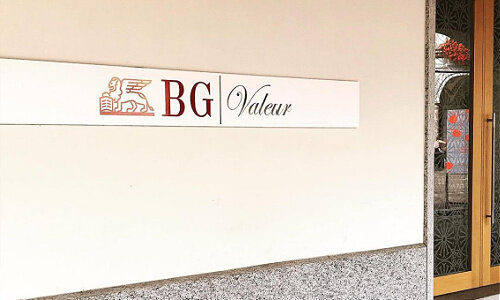Changes brought on by the pandemic have put the Swiss Italian region back on the map.
Even the youngest of millennials has clear memories of the train trip from Zurich to Lugano being well more than two hours long. But now, after the opening of the Ceneri tunnel in December 2020, it only takes one hour and 53 minutes. In short, Swiss Germans and Swiss Italians have never been this close.
If time is money, as the saying goes, then the shortened train ride is also a figurative light at the end of the tunnel for Switzerland's third largest financial hub. For as long as anyone can remember, Lugano, the region's largest city, seemed to prosper hand over fist from banking. But that all came to a screeching halt.
End of Banking Secrecy
In the spring of 2009, Switzerland caved in to pressure from abroad and lifted the veil on Swiss banking secrecy. It was only a year after Federal Councillor Hans-Rudolf Merz had publicly used a pithy, untranslatable saying in German that it was neither on the table or negotiable.
Italian authorities didn't squander any time. They motivated their citizens to repatriate assets held in Switzerland through various large scale tax amnesties. The flow of returning capital was enormous and it looked like the end of the Ticino fairytale was nigh. A totally one-sided dependence on Italian clients had turned into a nightmare.
Changed Paradigm

Many local financial institutes cut capacities as the inward flow of assets dried up, putting thousands of bank employees on the streets. The low point was then reached in 2017 when the last major Ticino bank, Banca della Svizzera Italiana (BSI, pictured above) lost its Singapore license as a result of Malaysia's 1MDB scandal, and subsequently collapsed into the arms of a competitor, EFG International.
Until about two years ago no-one thought Ticino finance was anything but history. But the pandemic has prompted a major inflection point, a changed paradigm. Widespread pandemic restrictions have cast a new light on the importance of local markets and clients, and the need for increased financial security. Practically overnight, it has also accelerated the ongoing drive to digitalize banking. All this, taken together, seems to have prompted an industry renaissance.
Nationally Recognized
Ticino has the substance, and enough touchpoints, to remain the third most important financial center in Switzerland after Zurich and Geneva, according to Matteo Bosco, a long tenured Credit Suisse executive and now partner at Conser, a research analysis boutique for sustainable investments.
He says there is a burgeoning industry cluster but that «the tendrils are still fragile even though they are growing continually. It is now crucial that they get stronger and more self-sustaining.»
A key touchpoint Bosco indicates is the Università della Svizzera italiana (USI), which has built a nationally recognized faculty in finance, keeping local students from drifting off to Zurich or St. Gallen.
Sustainable Finance

The Center of Banking Studies (picture above) in Vezia near Lugano is another important resource as is the advanced technical college Scuola universitaria professionale della Svizzera italiana (SUPSI), the latter offering education and research activities focused on sustainable finance. «All these institutions help to build up new areas of expertise - an important basis for growth», says Franco Citterio, Director of the Ticino Bank Association.
But that doesn't mean that money will start to effortlessly flow into the banks in the way that it once did. «The business has become more static, which is something generally seen across Ticino», indicates Philipp Rickenbacher, CEO of Bank Julius Bär, which has an office in Lugano.
Despite that, he also says that there are no plans for it to pull out.
No Complacency
A significant number of other institutions make up the rest of the puzzle in Ticino's new, reinvigorated hub. They comprise hedge funds, private equity boutiques and a broad array of companies in commodities trading, as well as blockchain developers and fintechs. All of them help to extend and deepen the hub's density and breadth.
There was nothing like this in the past. It was little more than a basic private banking business. Money just fell into everyone's lap - almost like manna from heaven. That complacency has gone and the thinking has changed. Everyone is aware of how precarious their position and everyone from the top on down are aware that they have to be very proactive to keep their current position.
Significant Proponents

It is also interesting that two Italian institutes have become among the largest proponents of the Ticino hub. Banca Generali took over Ticino asset management company Valeur Fiduciaria two years ago and it now calls itself BG Valeur (pictured above). The Lugano based business has applied for a Swiss Financial Market Supervisory Authority (FINMA) license and expects to receive one in 2022, as local sources indicate.
The second is Intesa, which bought a 69 percent stake in Geneva's Bank Reyl. It has long wanted to build up a larger presence in Switzerland and it will integrate its Ticino subsidiary Morval into Bank Reyl at the start of 2022. As part of that, it will build a center in Lugano for 90 employees to serve as a central hub for high net worth Italian and other overseas clients.
«They are the kind of clientele that have a large demand for the investments and financing that a Swiss bank can provide», says Nicolas Duchêne, a partner at Bank Reyl, on the relevance of Lugano in Intesa's future plans.
The Perfect Home Office
The timing for all this seems ideal. If Germans, Italians and the British had recently been seen turning their backs on Switzerland as a place to reside, the tide seems to have turned. Much of that is due to the pandemic, at least that is what a recent study by Swiss bank UBS says.
Real estate prices have also turned around, after Ticino had been one of the few regions in Switzerland recording declining property prices in recent years
«Demand is particularly strong for single family homes in the tourist regions», indicated Martin Neff, the chief economist for Raiffeisen Switzerland. They are also the kind of areas and regions that would be expected to profit from the COVID-19 prompted move to remote work and home offices.
German Longing

The risk of future tax increases abroad as a result of empty fiscal coffers has also risen significantly and the new government in Germany is likely to accelerate that development. Zurich-based lawyer Enzo Caputo who advises overseas clients about moving to Switzerland, said recently that demand for his services has risen by about a quarter, mainly from Germany, with Ticino a renowned and long sought after destination.
But a few more things need to fall into place before Ticino finance is fully reborn. Swiss financial institutions need to have access to the Italian market (image below). They do not have it now because of the EU Mifid II guidelines introduced in 2017, which forbids Swiss financial institutions without a presence in Italy from engaging in business there.
Economic Priorities

This is in contrast to Germany, where Swiss banks successfully applied for a simplified exemption from the requirement by BaFin, the German Federal Financial Supervisory Authority. For many private banks and independent asset managers, having a presence in Italy is just not on the cards, whether economically, or because of their inherent business models.
The legal situation does not fully exclude the possibility of bilateral agreements between Switzerland and individual EU countries. But they have to be based on mutual recognition. And, until now, Italy has been against any such agreements with overseas banks for political and economic reasons believing it is better to serve local clients domestically to keep jobs and ensure tax revenue.
The Swiss government also sees little recourse: «There are very rigid limits on any scenarios or strategies from the Swiss perspective.»
What that means, in the end, is that Ticino will have to rely on itself. Going by recent developments, that seems to be a given.


































